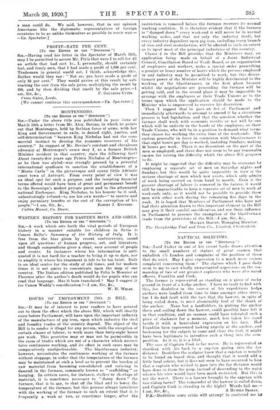HOURS OF EMPLOYMENT (NO. 2) BILL.
[TO THE EDITOR OP THE " SPECTATOR!"]
Sia,—It may be of interest to your readers to have pointed out to them the effect which the above Bill, which will shortly come before Parliament, will have upon the important industry of the manufacture of pig iron, upon which industry the steel and foundry trades of the. country depend. The object of the Bill is to render it illegal for any person, with the exception of certain classes of labour, to work more than forty-eight hours per week. This provision may or may not be permissible in the cases of trades which are not of a character which necessi- tates continuous working, and its effect in such cases may be comparatively unobjectionable. The blastfuruaco industry, however, necessitates the continuous working of the furnace without stoppage, in order that the temperature of the furnace may be maintained at such a level as to prevent the burden of raw material from becoming consolidated and refusing to descend in the furnace, commonly known as "scaffolding" or hanging. In certain cases, for instance, strikes or shortage of material, it is sometimes necessary to " damp down" the furnace, that is to say, to shut off the blast and to lower the temperature of the furnace, but this process always interferes with the working of the furnace to such an extent that it is frequently a week or two, or sometimes longer, after the
restriction is removed before the furnace recovers its normal working condition. It is therefore evident that if tho furnace is "damped down" every week-end it will never be in normal working order, and that not only the industry itself, but every industry dependent upon pig iron, including every branch of iron and steel manufacture, will be affected to such an extent as to upset most of the principal industries of the country.
Clause. 2 in the Bill provides that the Ministers may, on application being made on behalf of a Joint Industrial Council, Conciliation Board or Trade Board, or an organization of employers and workers, make a special order prescribing a greaser or lesser number of hours which the persons employed in any industry may be permitted to work, but this discre- tionary power of the Minister will be highly detrimental to the working of the blastfurnaces, in the first place because whilst the negotiations are proceeding the furnace will be getting cold, and in the second place it may be impossible to arrange with the employees or their Trade Unions as to the terms upon which the application should be made to the Minister who is empowered to exercise his discretion.
Then I suggest that to pass an Act of Parliament and immediately afterwards to attempt to amend it by a circuitous process is bad legislation, and that the question whether the furnace shall work with economic results or nut will be one which will be entirely in the hands of the employees, or their Trade Unions, who will he in a position to demand what terms they choose fur working the extra time at the week-ends. The custom generally in force in connexion with blastfurnaces is that eight hours per day is worked, inoluding Sundays, making 56 hours per week. There is no discontent on the part of the men so employed, and there does not seem to be any reasonable excuse for raising the difficulty which the above Bill proposes to do.
It might be suggested that the difficulty may he overcome be employing a separate set of men on Saturday nights and Sundays, but this would be quite impossible in view of the serious shortage of men which now exists, which only admits of work being carried on from hand to mouth. Even it the present shortage of labour is removed in the future, it would still be impracticable to keep a separate set of men to work at week-ends only, as it would not be possible to provide these
men with other work during the remaining five days in the week. It is hoped that Members of Parliament who have not had their attention drawn to this important element in the Bill may give it their careful consideration and use their influence in Parliament to procure the exemption of the blastfurnace trade from the provisions of the Bill.—I am, Sir, &e., MAURICE Dcscos, Managing Director. The Sheepbridge Coal and Iron Co., Limited, Chesterfield.




































 Previous page
Previous page